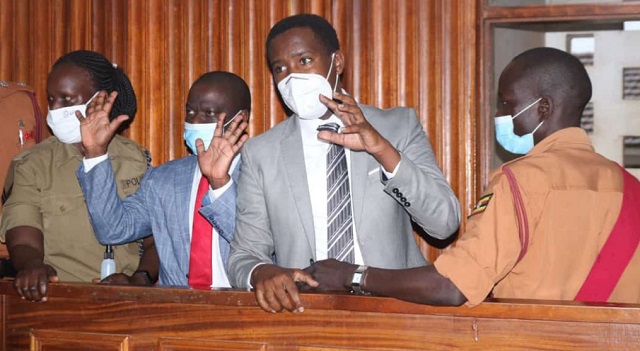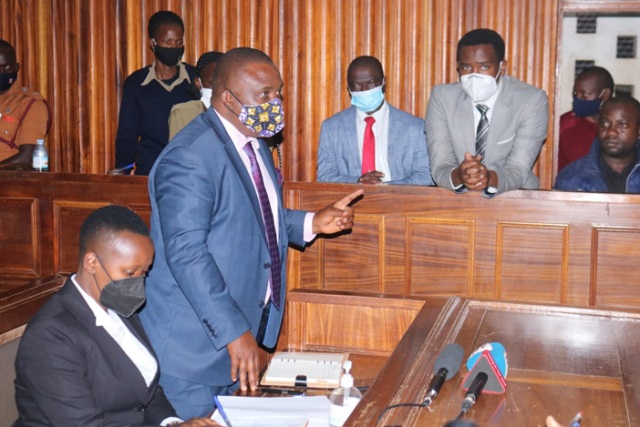
Why is government targeting the MPs over Masaka killings?
Kampala, Uganda | IAN KATUSIIME | The charge with murder and remand of MPs Allan Ssewanyana and Muhammad Ssegirinya, to Kitalya Prison (later switched to kigo) in connection with the killings in the Greater Masaka region has sparked criticism from angry supporters.
Meanwhile, for the general public desperately looking for answers for the unresolved killings, the arrest of the two MPs without producing basic evidence against them in court exposed the government’s weak hand.
At a press conference at the headquarters of the National Unity Platform (NUP), Leader of Opposition Mathias Mpuuga said the party is one that follows established laws and the constitutional order.
“We are NUP and not NUF which would stand for National Unity Force.”
Both Ssewanyana and Ssegirinya are prominent MPs under the NUP banner. Ssewanyana is the MP for Makindye West while Ssegirinya is a first term MP for Kawempe North.
The two MPs were charged alongside four others with three counts of murder and one of attempted murder allegedly committed on Aug. 23 in Masaka district. The MPs appeared confounded by the accusations levelled against them. Ssegirinya told journalists the day he was summoned by police to Masaka that the police were possibly mistaken.
“I take this as a mistaken identity. Maybe there is another Ssegirinya Muhammad, but not me,” he said.
He said he has faced a lot of problems since he was elected MP and blamed his political rivals.
“When I was a councillor, I was a free man,” he said.
He said he was not in the country when many of the killings happened.
“I wasn’t around since the killings started. I was in the Netherlands lobbying for my people,” he said.
Ssewanyana said he had been away in Japan for the Paralympics sports tournament only for him to hear the news. Lord Mayor Erias Lukwago, who has faced similar charges arising from his political activities, is the lawyer representing the two MPs.
Veteran opposition politician Dr. Kizza Besigye was incensed by the charge.
“Does the DPP Lady Justice Jane Frances Abodo and her staff comfortably go to bed with this kind of abuse of power our constitution vests in DPP’s office? Charges ought to have some “first impression” (prima facie) credibility!” Besigye tweeted on Sept. 7.
The killings in Masaka and Lwengo districts have been going on for the last four years. But the wave that recurred in August was haunting because over 30 people had been reported murdered by end of August. Gruesome images showed that the attackers hack their victims with machetes; many are elderly folks usually residing alone in the outskirts of the towns in the two areas.
The Masaka region is predominantly inhabited by Baganda and sections of Banyarwanda, which is why the arrest and charge of Kampala-city based MPs has sparked wide spread condemnation from the public in general.
MPs from the Greater Masaka area have consistently brought up the issue of the killings on the floor of parliament and they have also hammered the government for its lukewarm response.
“The regime was reluctant to act and we even saw the security personnel in greater Masaka complaining and asking for fuel,” Mpuga said.
Police have appeared clueless on who is behind the killings and unlike in the waves of recent years, they have this time found high profile individuals to target for the crime.
Soroti Woman MP Anne Adeke says the charge of her colleagues shows it is all politics. “If it were a political protest, police would be at the scene before protestors arrive,” Adeke says on the government delay to take any action and later zero in on opposition MPs.
“The bijambiya (machete) killings show us yet again that the security forces are a regime protecting force rather than a peoples’ protection force. The lack of instant attention in the area until the leaders cried out is saddening.” Adeke says.
Government spokesperson Ofwono Opondo was quoted as saying the arrest of Ssegirinya and Ssewanyanya does not mean the government is saying “NUP is for killers”. He said such an interpretation would come from a guilty mind that is afraid.
“It is possible that there is more than one trend in NUP; a democratic-civil wing that’s law-abiding, and another that’s violent, anarchist, and criminal,” he said.

Commenting on speculation that the case against Ssegirinya and Ssewanyanya would collapse for lack of evidence as has happened before in cases involving prominent opponents of President Yoweri Museveni’s government, Ofwono Opondo said successful prosecution is not always the main goal in the arrests.
“Prosecution is the last resort,” he said during a TV show, “sometimes the goal is to disrupt.”
Opondo’s line has been one trumpeted by the government since NUP emerged on the scene more than a year ago out of the People Power movement led by Bobi Wine.
President Museveni, top government and security officials have painted the red-branded party as their bogeyman resulting in arrests and persecution of those identifying with the party. During the election period in January and before, government propaganda went into overdrive spreading rumours that NUP supporters were planning to burn the city.
In spite of a lack of evidence, police and the army used the pretext to kidnap hundreds of NUP-supporting youth across the country subjecting them to torture and detention. Many are still unaccounted for.
Courts’ duty to accused
Meanwhile a Sept. 8 ruling in the Anti-Corruption Court in Nicholas Opiyo versus Uganda could come to the rescue of individuals like Ssewanyana and Ssegirinya facing politically trumped up charges.
Justice Lawrence Gidudu ruled that once a criminal case is lodged, courts have “constitutional and statutory powers” to prevent delay and abuse of process.
“It isn’t open to the prosecution to literally deposit its case in court and go to sleep,” Gidudu said.
The ruling fed directly into the debate on the charges preferred on the two MPs.
“Ideally investigations should precede arrest and charging.” It added, “This song of ‘investigations are incomplete’ is not itself sufficient cause to warrant an adjournment”.
Lawyer David Mpanga who has represented politically persecuted individuals like Dr. Besigye hailed the ruling as an important one for all criminal practitioners (prosecution and defence) to take note of. He added that the ruling had made it clear that Courts should protect accused persons’ right to a fair and speedy trial enshrined in Article 28(1) of the Constitution.
“Courts can and must demand that cases proceed,” Mpanga said.
The government has used cases like the one of treason slapped on Besigye in 2005 and 2016, and similarly on Bobi Wine in 2018 as a tool on which to keep opposition politicians on a constant leash. “This ruling is a useful addition to the criminal practitioners’ arsenal of precedents. Many cases take far too long in pre-trial stages as cases are filed in court before any meaningful investigations have been carried out. The gap also opens the system to abuse,” Mpanga noted.
He further advised defence lawyers to be vigilant and guard against abuse of process by unwarranted or even cynical delays citing the ruling further “The time the State is permitted by Court to get ready to prosecute depends on the reasons it demonstrates regarding the progress of investigations.”
“Court must be informed of the status of investigations and must exercise judicial discretion in the granting of each adjournment,” Mpanga concluded.
****
 The Independent Uganda: You get the Truth we Pay the Price
The Independent Uganda: You get the Truth we Pay the Price


